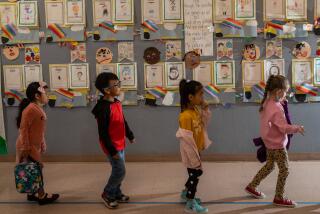Publicly Struck by the Randomly Flung Obscenity
- Share via
In Gilbert and Sullivan’s “H.M.S. Pinafore,” the well-bred but pompous Capt. Corcoran proudly proclaims to his crew:
Bad language or abuse
I never, never use,
Whatever the emergency.
Though “bother it” I may
Occasionally say,
I never use the big, big “D . “
To which his skeptical crew incredulously sing: “What, never?”
“Well,” he baritones back, “Hardly ever.”
I became acquainted with Gilbert and Sullivan operettas in a high school music-appreciation class in the late 1930s. The idea that anyone would claim he didn’t say the “big D” was not as unrealistic then as it would be today. We can assume that even then most Americans probably made at least occasional use of “big, big D”; but, at least in public, most never used any worse.
What, never? Well, hardly ever.
Use of vulgarity in public was then considered abhorrent and quite unacceptable; hence it was almost non-existent. At least this was so in the broad range of American middle classes that I had contact with. As to what kinds of utterances were common in the privacy of peoples’ living rooms or in then-existing subcultures, I cannot attest.
Most teen-agers, when I was one, made only moderate use of strong expletives. This occurred usually in groups of young males, of course. Due to rampant sexual inequality, young girls were nowhere in the running. But even the boys soft-pedaled their errant words when within earshot of parents or other grown-ups.
The public could safely ride buses, attend ballgames, and stand in lines without risk of being bombarded with what were then considered obscenities. I will admit we were an unashamedly puritanical lot.
Nowadays there is no social code to protect against a randomly flung vulgarism. In fact, if trends continue, what was once the vernacular of the uncouth and the uncultured will gradually become standard usage. The four-letter word bursts from the confines of the legitimate stage, has become a staple in films and is slowly oozing into television. I have even found it creeping into the shopping mall.
On a recent stop at a video-rental store, I was force-fed the sound track from one of those “post-adolescent rite-of-passage” flicks that abound these days. It was full of young actors whose names are known only to young moviegoers. So the dirty words were blaring for the benefit of all customers--men, women and children of all ages.
I can accept a limited amount of this language when I go to the theater (provided it comes from the screen and not from the audience). The difference is that I expect to hear it and assume that the others there assembled expect to also.
But to be involuntarily exposed to it when what is on my mind is simply to find some classic film to enjoy--wherein, thanks to the old Hollywood code, not so much as a big “D” will be uttered--is more than I care to encounter. Apparently, the store management is certain it will never have a couple of nuns drop in to pick up a copy of “Going My Way.” Or maybe they don’t care. Nor do they care if I should be there with my granddaughter trying to decide between “Benji” and “Snow White.”
Well, you can see how things have changed since Gilbert and Sullivan.
What does this mean for you and me if we wish to protect ourselves from the slings and arrows of outrageous offensiveness? Must we retreat from public places, avoid the crowds, live the life of a recluse? You can do that if you wish. But you can bet I won’t. As we used to say in the good old ‘30s, “S----s and s----s may break my b---s, but w---s will never hurt me!”
Capt. Corcoran! D--- it! See what you’ve started.
More to Read
The biggest entertainment stories
Get our big stories about Hollywood, film, television, music, arts, culture and more right in your inbox as soon as they publish.
You may occasionally receive promotional content from the Los Angeles Times.









